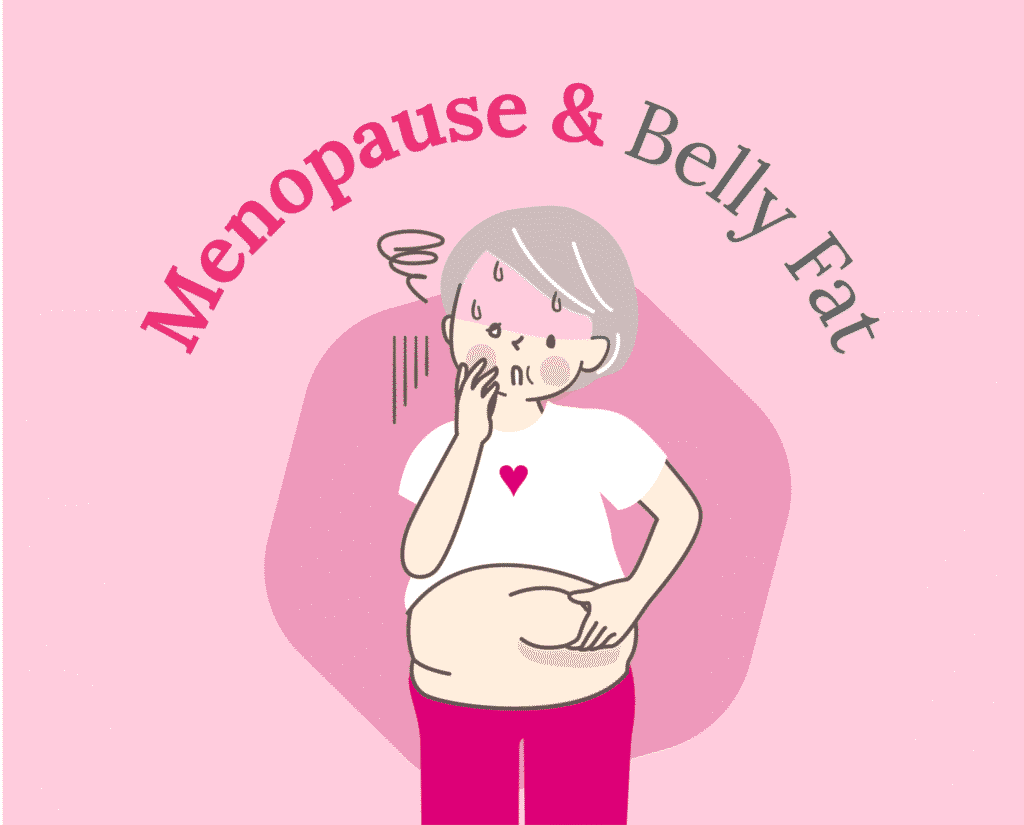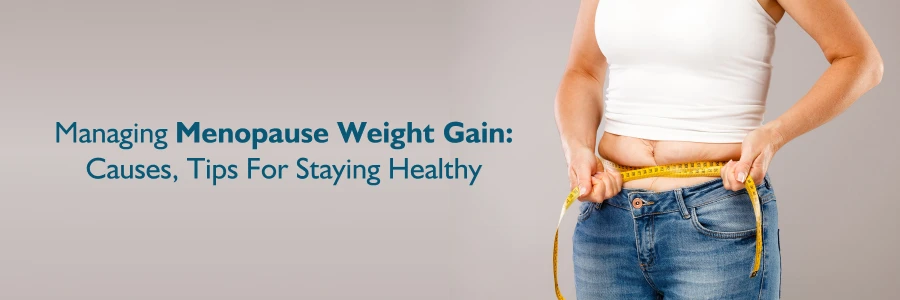Managing menopausal weight gain can feel like an uphill battle for many women. As hormones shift and metabolism slows, weight gain during menopause often appears suddenly and feels impossible to control. The good news? Understanding the reasons behind this change is the first step to overcoming it.

This article explains the reasons for menopausal weight gain and shares 10 proven tips on how to stop menopause weight gain while improving overall health and confidence.
What Is Menopausal Weight Gain?
Menopausal weight gain refers to the extra pounds many women notice around their midsection during menopause. Unlike typical midlife weight changes, this type of gain is strongly linked to hormonal shifts—particularly the decline in estrogen.
Lower estrogen levels make fat storage easier, especially around the abdomen. Many women also experience slower metabolism and reduced muscle mass, which further contribute to weight gain during menopause.

So, how to stop menopause weight gain? The solution lies in combining awareness of causes with practical lifestyle strategies, which this guide explores step by step.
Reasons for Weight Gain During Menopause
The main reasons for weight gain during menopause include:
- Hormonal imbalance: Declining estrogen and progesterone affect how fat is distributed.
- Age-related muscle loss: Less muscle means fewer calories burned at rest.
- Slower metabolism: Common in midlife and worsened by hormonal changes.
- Stress and lifestyle factors: Increased cortisol from stress promotes belly fat storage.
Recognizing these reasons empowers women to take control and make changes before weight becomes a long-term health risk.
Hormonal Changes and Weight Gain in Menopause
One of the strongest drivers of menopausal weight gain is hormonal imbalance. Estrogen and progesterone decline while insulin resistance becomes more common, making fat storage around the belly more likely.
- Menopause and insulin resistance can trigger cravings and higher blood sugar.
- Menopause and slow metabolism further increase weight struggles.
Together, these hormonal shifts explain why belly fat becomes more stubborn during menopause.
Menopause Belly Fat Solutions
Menopause belly fat solutions focus on lifestyle adjustments:
- Strength training to rebuild lost muscle.
- Higher protein intake to support metabolism.
- Cutting back on processed carbs and sugar.
- Prioritizing stress management through yoga or meditation.

Diet Tips for Menopause Weight Gain
Practical diet tips for menopause weight gain include:
- Choose low-GI foods like oats, lentils, and sweet potatoes.
- Add fiber-rich vegetables to aid digestion and satiety.
- Stay hydrated to prevent overeating triggered by thirst.
Some of the best foods to reduce menopause weight gain are leafy greens, salmon, lean proteins, and whole grains.
Exercise for Menopause Weight Gain

Exercise for menopause weight gain is essential for fat burning and muscle preservation. The best approach includes:
- Cardio exercises such as walking, cycling, or swimming.
- Strength training to maintain lean body mass.
- Yoga or Pilates for stress reduction and flexibility.
Consistent activity makes it much easier to manage weight gain during menopause and supports long-term health.
Lifestyle Changes to Manage Menopause Weight
Effective lifestyle changes to manage menopause weight include:
- Prioritizing 7–8 hours of sleep each night.
- Reducing stress, since cortisol increases belly fat.
- Practicing mindful eating to avoid emotional overeating.
Many women also explore natural remedies for menopausal weight gain, such as herbal teas, adaptogens, and mindful breathing practices.
Natural Remedies for Menopausal Weight Gain
Holistic methods can complement diet and exercise. Examples include:
- Herbal remedies like black cohosh or green tea.
- Incorporating omega-3 fatty acids for hormone support.
- Gentle practices like meditation or tai chi to regulate stress.
While natural solutions can be helpful, combining them with medical advice is the safest way to manage menopausal weight gain.
FAQs on Menopausal Weight Gain
Q1: Is weight gain normal during menopause?
Yes, but not inevitable. With the right strategies, women can maintain a healthy weight.
Q2: What are the best foods to reduce menopause weight gain?
Whole grains, lean proteins, vegetables, and omega-3-rich foods are top choices.
Q3: How to lose weight after menopause at 50?
Consistency is key: follow a balanced diet, stay active, and manage stress.
Q4: Does menopause cause slow metabolism?
Yes, many women face menopause and slow metabolism, making weight harder to lose.
Q5: Is menopause linked to insulin resistance?
Yes, menopause and insulin resistance can worsen fat accumulation and cravings.
Conclusion
In summary, menopausal weight gain is influenced by hormonal shifts, slower metabolism, and lifestyle factors. By understanding the reasons for weight gain during menopause and adopting strategies like tailored diet, exercise, and stress management, women can effectively manage their health.
From menopause belly fat solutions to natural remedies for menopausal weight gain, the path forward involves combining lifestyle changes with medical guidance.
Every woman’s journey is unique, so consulting a doctor or dietitian for personalized support is always recommended.
Related Articles
Can Gallbladder Issues Cause Weight Gain?
Can Gallstones Cause Weight Gain?
High Blood Sugar Weight Gain

